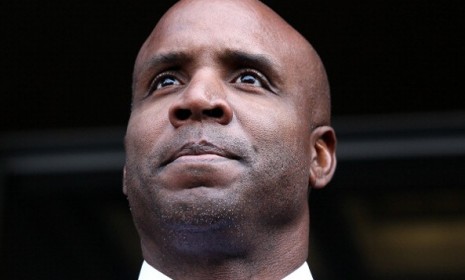The Barry Bonds conviction: What does it mean?
Baseball's polarizing home-run king is guilty of obstructing justice during the feds' steroid probe — but beats the rap on more serious perjury charges

A free daily email with the biggest news stories of the day – and the best features from TheWeek.com
You are now subscribed
Your newsletter sign-up was successful
On Wednesday, a jury convicted home run king Barry Bonds on one count of obstruction of justice, but reached no verdict on three more serious counts of perjury. The jurors did not agree that Bonds knowingly lied in 2003 about using performance-enhancing drugs — which was the centerpiece of the government's case against him. Instead, in a "mixed and muddled verdict on the slugger that left more questions than answers," as ESPN put it, they ruled that Bonds obstructed justice by evading the steroids question during his testimony. Bonds will appeal the verdict, and will find out next month whether he will serve jail time (though that seems highly unlikely). What can we learn from this verdict?
It shows America wants to move beyond steroids: "We just were handed the clearest possible message that baseball's Steroids Era will die not with a big hit of a verdict but with a shrug of indifference," says Mark Bradley at The Atlanta Journal-Constitution. We long ago convicted Bonds in the court of public opinion, but the zeal with which prosecutors went after him had "become an embarrassing bit of overkill." And in the end, accusing people of cheating at a game many, many years ago serves little purpose. That's the real message: "Move on, please."
"A tepid Bonds verdict reveals an outbreak of steroids fatigue"
The Week
Escape your echo chamber. Get the facts behind the news, plus analysis from multiple perspectives.

Sign up for The Week's Free Newsletters
From our morning news briefing to a weekly Good News Newsletter, get the best of The Week delivered directly to your inbox.
From our morning news briefing to a weekly Good News Newsletter, get the best of The Week delivered directly to your inbox.
It hurts Bonds' (already slim) Hall of Fame chances: Next year, Bonds will be eligible for baseball's Hall of Fame, says Tyler Kepner at The New York Times. The court's decision "does not help his cause," although most fans already thought of Bonds as a cheater. His home run record and all his other gaudy stats will never be erased from baseball's records books — "but while facts are facts, the Hall of Fame is subjective, and the guardians of Cooperstown are not keen on cheaters." It remains to be seen whether they'll make an exception for Bonds.
"Judging Bonds has only just begun"
It failed to answer many nagging steroid questions: "At its heart, baseball's steroids era was about ambiguity," says Dave Sheinin at The Washington Post — questions unanswered, positive tests denied, and moral gray areas. In that sense, the Bonds verdict was a "a fitting outcome," because it failed to shed light on much of anything. "We can’t even get a definitive answer to the simple question of whether Barry Bonds lied about using steroids," and the jury's conclusion is "wholly unsatisfying to anyone in search of hard answers, closure or simple justice."
"In Bonds trial, more steroid ambiguity"
A free daily email with the biggest news stories of the day – and the best features from TheWeek.com
-
 Quentin Deranque: a student’s death energizes the French far right
Quentin Deranque: a student’s death energizes the French far rightIN THE SPOTLIGHT Reactions to the violent killing of an ultra-conservative activist offer a glimpse at the culture wars roiling France ahead of next year’s elections.
-
 Secured vs. unsecured loans: how do they differ and which is better?
Secured vs. unsecured loans: how do they differ and which is better?the explainer They are distinguished by the level of risk and the inclusion of collateral
-
 ‘States that set ambitious climate targets are already feeling the tension’
‘States that set ambitious climate targets are already feeling the tension’Instant Opinion Opinion, comment and editorials of the day